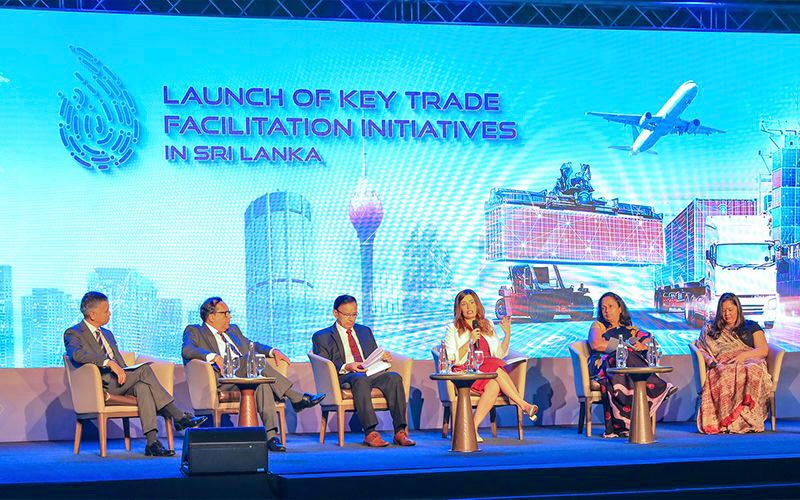Tuesday Feb 24, 2026
Tuesday Feb 24, 2026
Monday, 14 August 2023 02:33 - - {{hitsCtrl.values.hits}}

The panel discussion
|
President Ranil Wickremesinghe launching the set of digital platforms to transform the landscape for Sri Lankan SMEs in global trade
|
The International Trade Centre (ITC), in partnership with the Deutsche Gesellschaft für Internationale Zusammenarbeit (GIZ Sri Lanka) proudly unveiled a transformative suite of digital platforms poised to revolutionise the landscape for Sri Lankan SMEs engaged in international trade.
The platforms were officially launched by President Ranil Wickremesinghe at an event organised by ITC and GIZ together with the Presidential Secretariat in Colombo last week.
The four game-changing systems are set to empower SMEs to soar to new heights of success and competitiveness in the global market. They include the e-Certificate of Origin (e-CoO) System at the Department of Commerce (DoC), the Electronic Payment Gateway at the National Plant Quarantine Service (NPQS) of the Ministry of Agriculture, the digitalisation of the Registration and Monitoring of Organic Agriculture-Related Stakeholders at the National Organic Control Unit (NOCU), and the Development of a Progress Monitoring Tool for the National Trade Facilitation Committee (NTFC).
The fully digitalised e-CoO system streamlines the issuance of Preferential Certificates of Origin, crucial for establishing goods’ origin and eligibility for trade agreement benefits. The system remarkably reduces the CoO issuance time by 93%, with the processing time reduced to just 30 minutes, which saves considerable costs and lowers the carbon footprint, fostering an eco-friendly trade by obviating multiple trips and paper documentation.
The e-Payment Gateway at the NPQS offers traders convenient and secure payment options, enabling swift transactions from any location. This advancement leads to an impressive 94% time savings for businesses, eliminating the need for time-consuming in-person payments. Furthermore, the system includes analytics and reporting tools for informed decision-making.
The NOCU’s digital Registration and Monitoring system streamlines organic stakeholder registration and certification, ensuring smooth compliance and supply chain continuity. This platform empowers stakeholders to effortlessly register and monitor certifications online, saving 96% of their time and approximately Rs. 50,000 per registration.
The Progress Reporting and Monitoring Tool for the NTFC tracks trade reforms in real time, aiding strategic decisions. It connects border agencies, NTFC members, donors, and businesses for smooth information flow, coordination, and effective facilitation efforts.
Following the launch, a panel discussion moderated by ITC Program Manager and Trade Facilitation Advisor Raghad Altalli, took centre stage, delving into the transformative potential of each innovation. Esteemed panellists included Export Development Board Chairman/CEO Dr. Kingsley Bernard, Department of Commerce Acting Director/General Gilma Dahanayake, NTFC Secretariat Head Achala Chandrasekera, Ceylon Chamber of Commerce Secretary General Buwanekebahu Perera, GIZ SME Sector Development Program Sri Lanka Component Manager Shalindri Perera and JICA Sri Lanka Office Chief Representative Yamada Tetsuya.
The initiatives are implemented with the technical assistance of ITC and GIZ, within the framework of the Trade Facilitation for SMEs project funded by the German Federal Ministry of Economic Cooperation and Development (BMZ).
The event was also attended by Agriculture Minister Mahinda Amaraweera, Trade, Commerce, and Food Security Minister Nalin Fernando, State Finance Minister Shehan Semasinghe, Investment Promotion State Minister Dilum Amunugama and Technology State Minister Kanaka Herath. The event also saw the presence of Ambassadors and High Commissioners, representatives from the United Nations. Secretary to the President and Secretaries from various relevant Ministries, delegates from the ITC, German Government and GIZ, as well as stakeholders from the private sector, trade chambers, and academia.